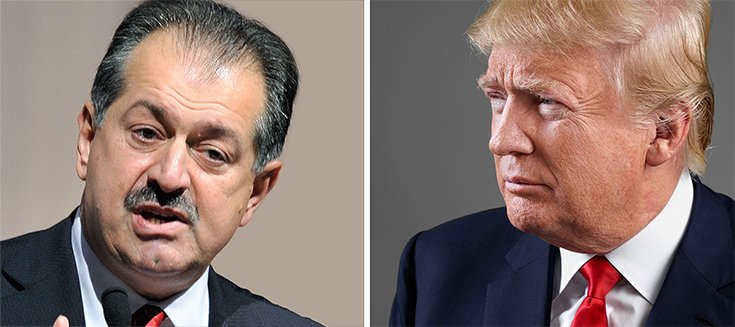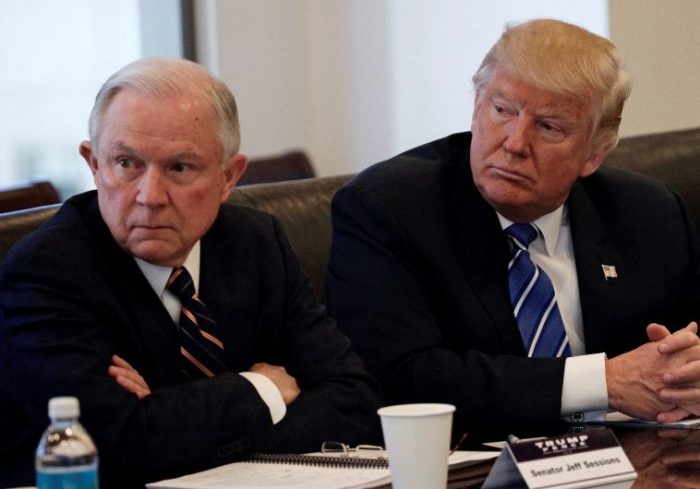Trump Picks Dow Chemical CEO to Head Manufacturing Council

President-elect Donald Trump has named Dow Chemical CEO Andrew Liveris to head the American Manufacturing Council. [1]
After Trump announced his pick at a stop on his thank-you tour in Grand Rapids, Michigan earlier this month, Liveris, who has dual U.S.-Australian citizenship, took to the stage to announce a new state of the art innovative center The center “will support approximately 200 research and development jobs in Michigan, including 100 newly-created jobs while repatriating 100 jobs from other Dow facilities throughout the globe to Midland.” [2] [3]
Good for Jobs, Bad for Everyone Else?
The appointment might be good for jobs, but it could be bad news for farmers, crops, and the average Joe.
In January 2016, Dow Chemical and DuPont announced a $130 million merger deal in which the conglomerate would actually split into 3 separate independently-traded companies: 1 in agrichemicals, 1 in specialty products, and 1 in materials science.
The deal would make Dow and DuPont one of the biggest chemical makers in the United States (as if they both aren’t already). In November, several states joined pending antitrust investigations into that deal, as well as a merger between Bayer and Monsanto.
The concern is that once Dow and DuPont merge, farmers will be faced with higher pesticide and herbicide prices, and the companies would have less incentive to compete to produce “better” and cheaper products.
(Note that “better” is in quotes because there is arguably no “good” pesticide or herbicide.)
In turn, food prices would increase, even more pesticides will be used, and there will be fewer options for buyers at the grocery store.
Investigators will reportedly look into DuPont’s Altacor and Dow’s Intrepid insecticides. Both are applied to high-value crops like almonds, pistachios, grapes, and apples. They are chemically different but overlapping products.

Despite the investigations and mounting concerns, DuPont CEO Ed Breen said December 8 said that Trump’s incoming administration was unlikely to affect his company’s merger with Dow – and that was before Trump announced he had picked Liveris to head the American Manufacturing Council. [4]
Traditionally, Republican presidents have a lighter touch when it comes to major mergers.
Breen, when asked what potential disinvestments might be necessary to complete the merger, said there would likely “be some remedies on the agriculture side, and that’s predominantly it.”
With Breen at the helm of the council, a new concern emerges: that the CEO will use his government post to benefit Dow. Friends of the Earth Food Futures campaigner Tiffany Finck-Haynes said:
“Andrew Liveris should be disqualified for the position due to his likely conflicts of interests. Serving as head of the American Manufacturing Council could allow Liveris to use a government post to benefit Dow Chemical and to line his own pockets.” [5]
The Justice Department will have the final say on the looming merger. Trump’s pick for attorney general, Jeff Sessions, has received campaign contributions from Monsanto and Bayer. In fact, agribusiness is one of the top sectors to donate funds to Sessions’ campaigns. The Senator from Alabama will head the agency investigating the economic impact and antitrust implications of the proposed mergers.

Finck-Haynes said:
“Donald Trump’s picks demonstrates that he is willing to allow corporate interests to control the food that’s grown in our country and determine what’s on our plates. Despite his promise to ‘drain the swamp,’ his actions prove he is more concerned with advancing corporate interests than protecting the American people, workers and farmers.”
But Trump could surprise everybody. During his campaign, the billionaire businessman threatened to block AT&T Inc’s planned purchase of Time Warner Inc. Trump ran an “everyman” campaign and focused much of his attention on wooing Midwesterners. He promised to stick up for the “little guy” and told the forgotten citizens of this country that he saw them and would fight for them. [4]
Jerry Gulke of The Gulke Group recently told CNBC that nearly every sector in agriculture “is underwater and barely profitable,” so Trump can’t afford to go back on his promises.
Sources:
[1] CNN
[3] ABC News
[4] Reuters
